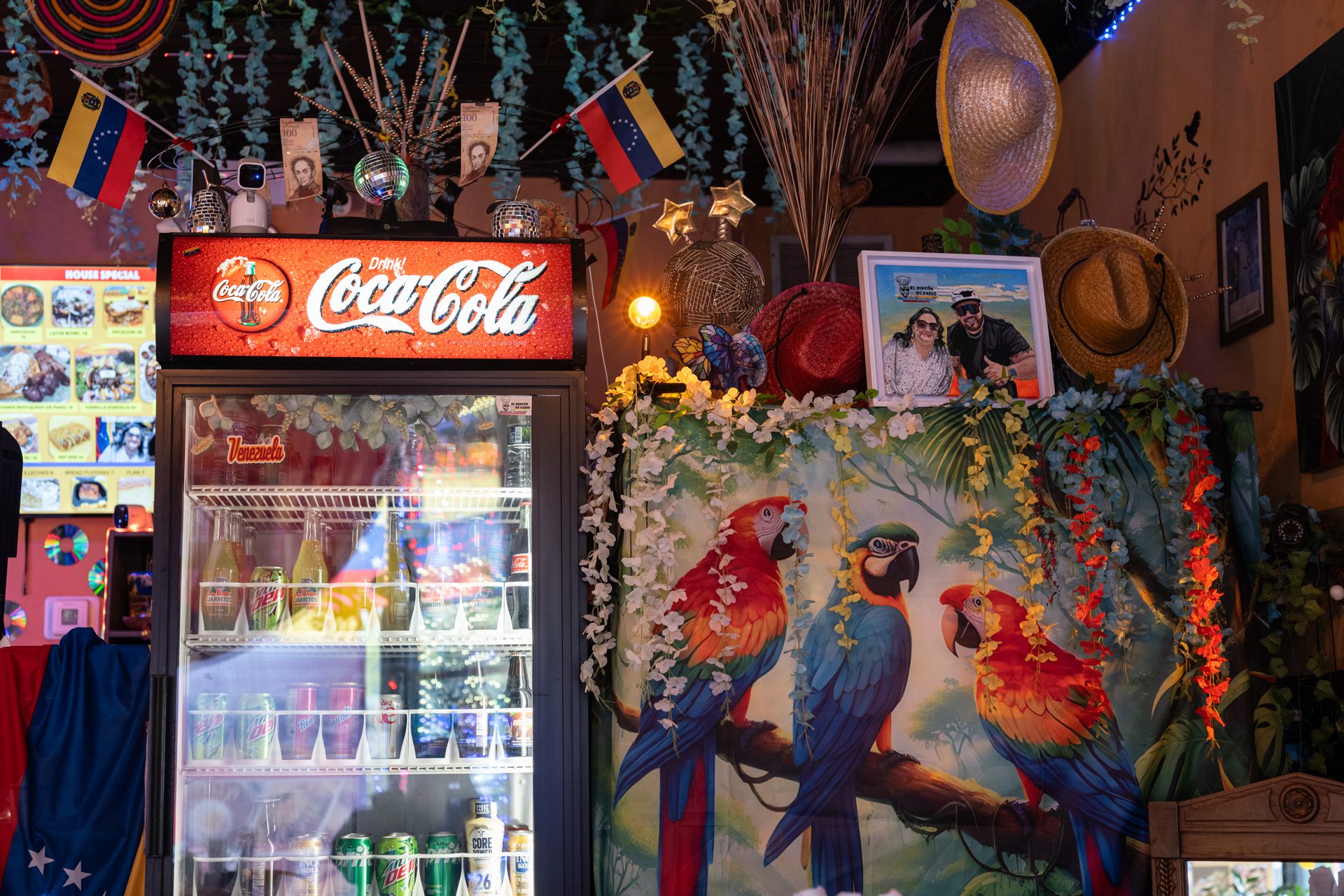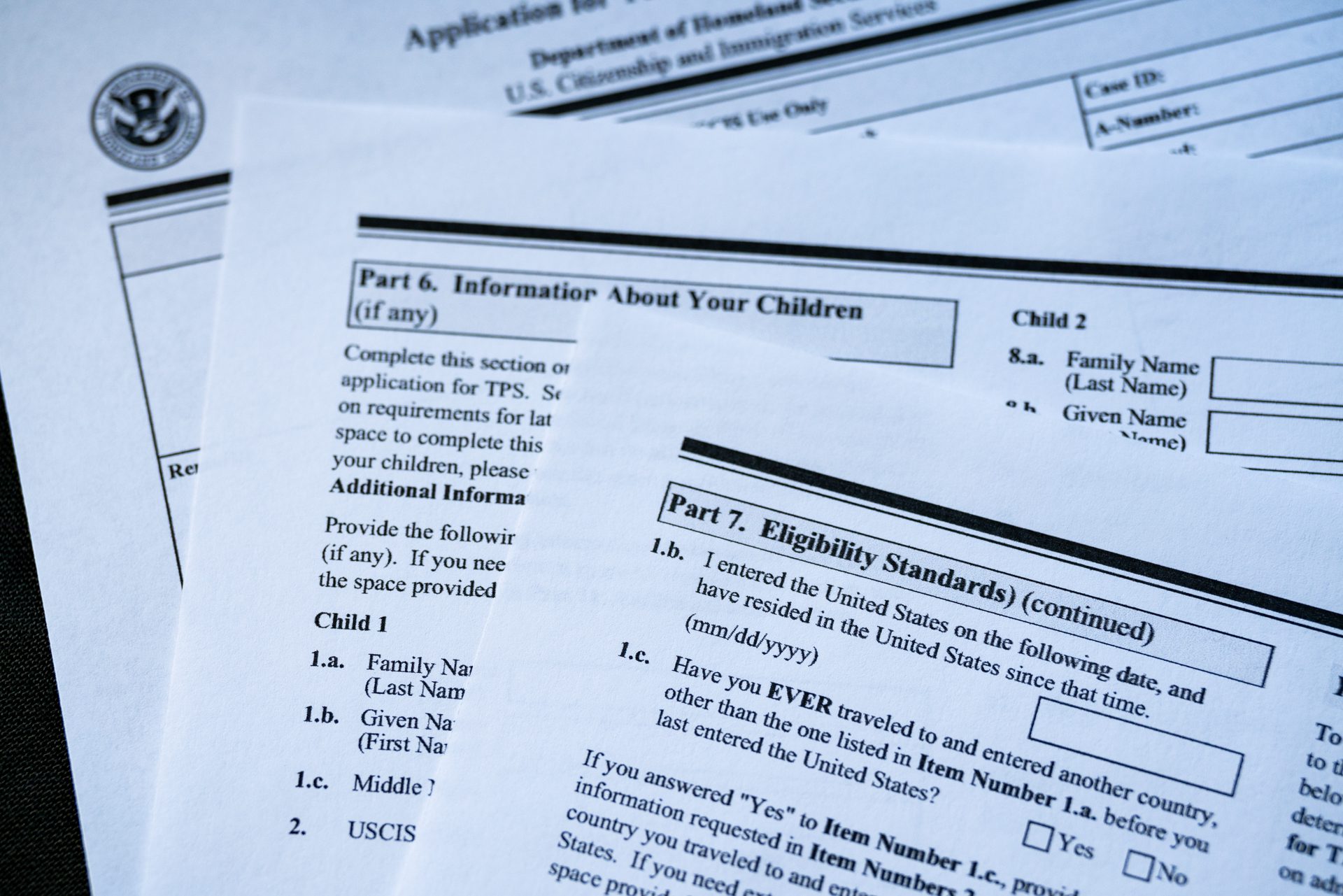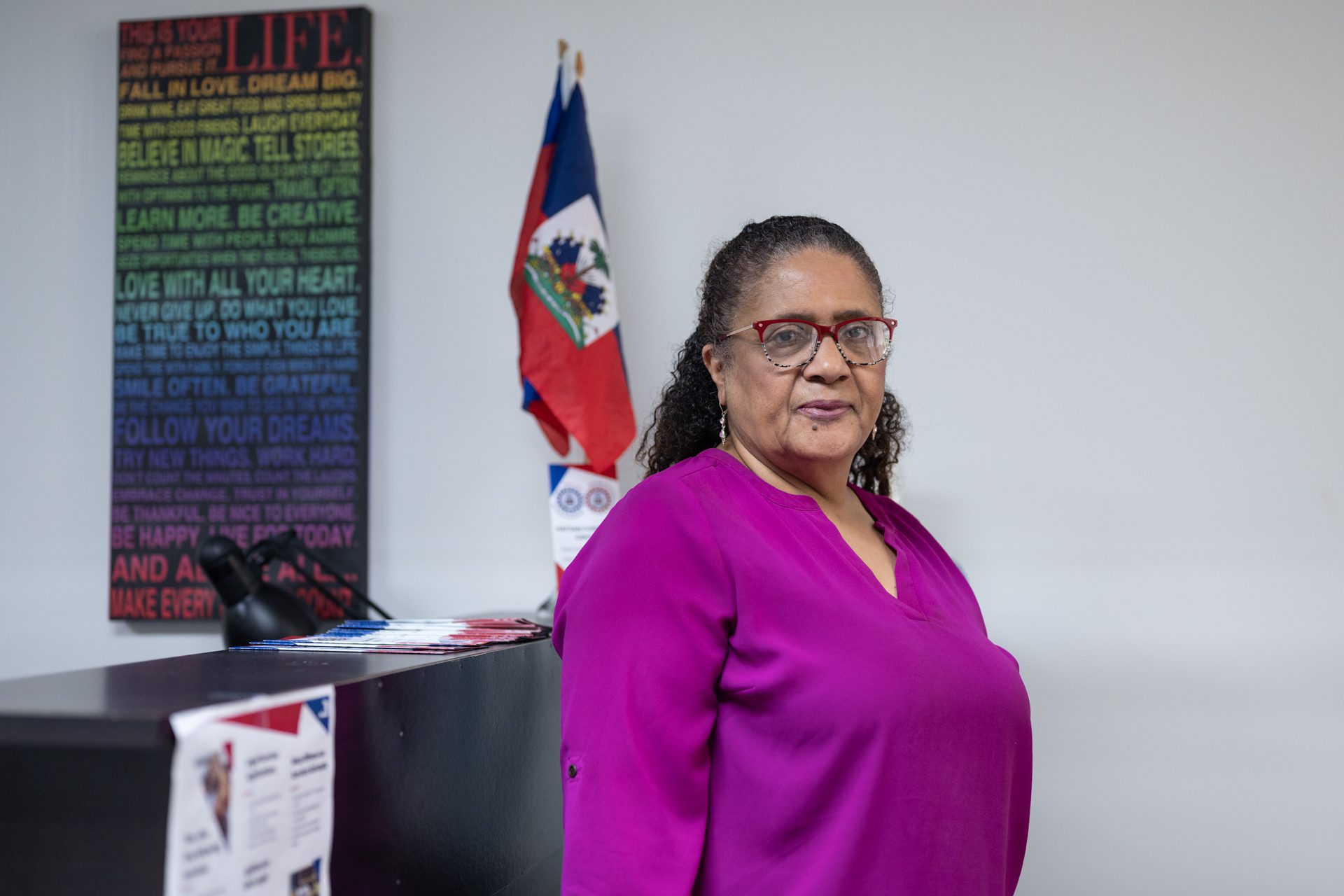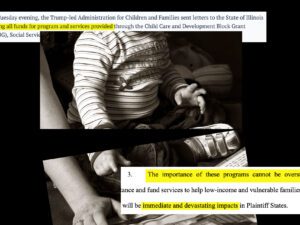 Max Herman/Borderless Magazine
Max Herman/Borderless MagazineMientras la Corte Suprema apoya la revocación del TPS, inmigrantes de Venezuela y Haití en Chicago piden protección.
La masa fresca y el inconfundible aroma de las arepas venezolanas llenan las paredes de un vibrante restaurante de un vecindario del norte de Chicago.
Decorado con fotos y flores rojas, naranjas y azules, el restaurante rebosa de risas y la calidez de una comunidad a miles de kilómetros de casa. De un altavoz sale una mezcla de canciones venezolanas y de otros países latinoamericanos, como joropo, gaita, bachata y salsa.
Este restaurante es una celebración de la comida y la cultura venezolana. Su propietario, Fabián, dice que tardó seis años en abrir el restaurante. Su apellido se mantiene confidencial debido al riesgo de deportación.
Noticias que ponen el poder en el punto de mira y a las comunidades en el centro.
Suscríbase a nuestro boletín gratuito y reciba actualizaciones dos veces por semana.
"He empezado de cero trabajando en la cocina como lavaplatos, ayudante de cocina, limpiador de oficinas, y obrero de la construcción para ahorrar y abrir mi negocio," dijo Fabián.
Ahora, dice que su restaurante simboliza lo que está en juego en medio de los continuos ataques del presidente Donald Trump contra las protecciones legales para inmigrantes como Fabián.
El mes pasado, la Corte Suprema permitió a la administración del presidente Donald Trump revocar el estatus legal de cientos de miles de inmigrantes de Cuba, Haití, Nicaragua y Venezuela. La decisión conmocionó a Fabián y a otras personas en todo el país, que esperaban ansiosamente una actualización sobre sus protecciones legales. El fallo de la Corte Suprema, que puso en pausa una decisión de un tribunal inferior que mantuvo vivo el Estatus de Protección Temporal (TPS, por sus siglas en inglés), ahora ha allanado el camino para que el gobierno federal reanude las deportaciones.
El Departamento de Seguridad Nacional (DHS, por sus siglas en inglés) celebró la medida como "una victoria para el pueblo estadounidense." Un portavoz del DHS acusó a la administración Biden de "mentir" a Estados Unidos al permitir que "más de medio millón de extranjeros de Cuba, Haití, Nicaragua y Venezuela y sus familiares directos, con una investigación deficiente, ingresaran a los Estados Unidos a través de estos desastrosos programas de libertad condicional."
Pero la decisión marcó un nuevo capítulo aterrador para muchos venezolanos como Fabián y otros con TPS.
"Poner fin al TPS sería un golpe devastador para aquellos que ya han construido una vida aquí," dijo Fabián, un beneficiario del TPS que llegó a Chicago en 2017. "Soy dueño de un negocio. Pago impuestos. Creo empleos, contribuyo a mi comunidad todos los días."
Crisis de Refugiados Venezolanos
El régimen del presidente venezolano Nicolás Maduro se ha condenado internacionalmente y el país sigue en crisis en medio de dudas sobre la legitimidad de las últimas elecciones.
Recientemente, el gobierno venezolano declaró una "emergencia económica" en medio de una inflación galopante y represión política. Grupos de derechos humanos han advertido que devolver a los migrantes a Venezuela en las condiciones actuales podría exponerlos a la violencia, la persecución o la muerte.
Venezuela fue designada por primera vez para el TPS en 2021, tras años de disturbios civiles y colapso económico que vieron a más de 7,6 millones de personas huir del país hasta junio de 2024. Bajo el TPS, los inmigrantes están protegidos de la deportación y les permite trabajar, y se renueva cada 18 meses.
"No nos fuimos de Venezuela sólo por problemas económicos, nos fuimos porque temíamos por nuestras vidas," dijo Juan, un venezolano beneficiario del TPS cuyo apellido se mantiene confidencial debido a los elevados riesgos de deportación.
Juan, antiguo locutor de un medio de comunicación nacional de Venezuela, llegó a Chicago en noviembre de 2023. Vino con su hija de ocho años en busca de seguridad.
"Vinimos a Estados Unidos para dar a mi hija un mejor acceso al sistema sanitario, a la educación y a un futuro más brillante," dijo Juan.
En Venezuela, Juan vio morir a su esposa de cáncer a causa del colapso casi total del sistema sanitario.
"Los hospitales están fracturados," dijo. "Los derechos básicos no están garantizados. Tuvimos que marcharnos."
Tras el fallo, Juan se preocupa por su vida y la de su hija en Estados Unidos.
La Alianza Venezolana de Illinois (IVA, por sus siglas en inglés) dijo que el fallo de la Corte Suprema "colocaba a estas personas en una situación precaria."
"Esta decisión amenaza con desestabilizar a las familias, perturbar a las comunidades, y poner en peligro la seguridad y el bienestar de las personas que han buscado refugio de la persecución política y las dificultades económicas."
IVA subrayó que los beneficiarios del TPS deben renovar continuamente sus protecciones para evitar la deportación, incluso si buscan formas más permanentes de estatus migratorio. "El prolongado proceso de litigio ya ha causado un daño irreparable a la comunidad venezolana afectada," añadió el comunicado.

El miedo a la deportación le pesa a muchos venezolanos con TPS.
"Enviar a los venezolanos de vuelta es enviarlos directamente a la muerte," dijo Fabián. "Sólo publicar algo en WhatsApp puede llevarte a la cárcel. No es seguro."
Un Refugio Seguro
La administración Trump ha buscado durante mucho tiempo poner fin al TPS no solo para los venezolanos, sino también para los haitianos y otras personas de naciones afectadas por crisis. Cuando la Administración Biden extendió el TPS para los migrantes haitianos en octubre de 2022, el gobierno central de Haití estaba al borde del colapso. El país seguía sumido en una prolongada crisis política, humanitaria y de seguridad.
"Haití lleva años atravesando una crisis terrible... pero ha empeorado... Y por eso pedimos sólo un poco de tiempo para ver cómo van a solucionar esto [los migrantes haitianos] antes de enviarlos de vuelta," dijo Aline Lauture, directora de programas del Haitian Congress Center. "Es como si los enviaras al fuego".
"Es desalentador ver el desmoronamiento de un sistema que apoyaba a la gente, aunque fuera temporalmente," dijo Lauture. "La gente está en shock, y luego aparece la ansiedad, el miedo—los niños tienen miedo de ir a la escuela. La gente en la comunidad... tiene miedo de salir."

Aunque la decisión de la Corte Suprema no puso fin al litigio, los grupos de defensa de los inmigrantes advierten de que ya ha causado daños duraderos.
"Sin el TPS, muchos venezolanos podrían ser deportados, podrían decidir viajar a otros países, o podrían ser etiquetados arbitrariamente como miembros del Tren de Aragua o como combatientes enemigos y enviados a El Salvador o a otro país," dijo Helena Olea, vicedirectora de Alianza Américas.
"Todas ellas son alternativas devastadoras que ponen a personas que lo merecen en riesgo inminente de violaciones de derechos humanos."
En otro caso, la Corte Suprema reprendió a la administración Trump por intentar deportar a venezolanos acusados de pertenecer a la violenta pandilla del Tren de Aragua, en virtud de la raramente utilizada Ley de Enemigos Extranjeros de 1798.
"Me parece muy preocupante e injusto que el gobierno haga generalizaciones vinculando a algunos venezolanos con las pandillas," dijo Fabián. "Como en cualquier comunidad, puede haber algunos individuos con malas intenciones, pero eso no representa al pueblo venezolano. Vinimos aquí para trabajar duro, mantener a nuestras familias, y reconstruir nuestras vidas con dignidad."
Fabián espera que el gobierno estadounidense vea más allá de los estereotipos. "Espero que las autoridades se tomen el tiempo de reconocer las verdaderas contribuciones que nuestra comunidad está haciendo," dijo. "Poner fin al TPS sería como cortarnos las alas justo cuando aprendemos a volar."
Mientras tanto, el DHS ha empezado a promover unainiciativa de "autodeportación voluntaria”, que ofrece un estipendio de $1.000 a las personas que utilicen la aplicación en línea para autodeportarse. Según funcionarios panameños, más de 10.000 venezolanos han tomado embarcaciones desde Panamá a Colombia desde enero, una señal aparente de que algunos migrantes ya han empezado a retirarse de Estados Unidos.
Aun así, muchos siguen en el limbo, sin poder regresar a casa e inseguros sobre su futuro en Estados Unidos.
Organizaciones como Alianza Américas y la Alianza Venezolana de Illinois instan al público y a los legisladores a actuar con empatía. "Ahora más que nunca, la solidaridad y la acción compasiva son necesarias para abordar la crisis de los inmigrantes venezolanos con empatía y pragmatismo," declaró IVA.
"No pedimos limosna. Pedimos una oportunidad para vivir, trabajar y estar seguros," dijo Juan.
Para más de 500.000 beneficiarios del TPS como Juan y Fabián, el presente está impregnado de miedo y el futuro sigue sin estar claro.
"Conozco a gente que ha contribuido a este país durante años," dijo Juan. "No pedimos limosna. Pedimos una oportunidad para vivir, trabajar y estar seguros."
Fatema Hosseini es becaria del Roy W. Howard Investigative Reporting que cubre las comunidades inmigrantes para Borderless Magazine. Envíele un correo electrónico a [email protected].


